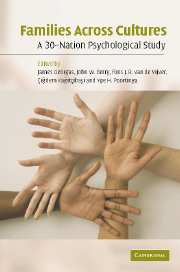Book contents
- Frontmatter
- Contents
- List of figures
- List of tables
- List of contributors
- Acknowledgments
- Prologue
- Part I
- Part II
- 9 The Algerian family: change and solidarity
- 10 Botswana
- 11 The Brazilian jeitinho: Brazil's sub-cultures, its diversity of social contexts, and its family structures
- 12 Britain
- 13 Bulgaria: socialism and open-market economy
- 14 Canada
- 15 Chile: new bottle, old wine
- 16 Cyprus
- 17 Portrait of family in France
- 18 Georgia
- 19 Germany: continuity and change
- 20 Ghana
- 21 Greece
- 22 Hong Kong, SAR China: transitions and return to the motherland
- 23 India
- 24 Indonesia: traditional family in a changing society
- 25 The Iranian family in a context of cultural diversity
- 26 Japan: tradition and change in the Japanese family
- 27 Mexico
- 28 Mongolia: traditions and family portrait
- 29 The Netherlands: tolerance and traditionalism
- 30 Nigeria
- 31 Pakistan: culture, community, and filial obligations in a Muslim society
- 32 The Saudi society: tradition and change
- 33 The South African family
- 34 South Korea
- 35 Spain: tradition and modernity in family structure and values
- 36 Turkey
- 37 Ukraine
- 38 Family in the United States: social context, structure, and roles
- Appendix
- References
- Index
10 - Botswana
Published online by Cambridge University Press: 10 December 2009
- Frontmatter
- Contents
- List of figures
- List of tables
- List of contributors
- Acknowledgments
- Prologue
- Part I
- Part II
- 9 The Algerian family: change and solidarity
- 10 Botswana
- 11 The Brazilian jeitinho: Brazil's sub-cultures, its diversity of social contexts, and its family structures
- 12 Britain
- 13 Bulgaria: socialism and open-market economy
- 14 Canada
- 15 Chile: new bottle, old wine
- 16 Cyprus
- 17 Portrait of family in France
- 18 Georgia
- 19 Germany: continuity and change
- 20 Ghana
- 21 Greece
- 22 Hong Kong, SAR China: transitions and return to the motherland
- 23 India
- 24 Indonesia: traditional family in a changing society
- 25 The Iranian family in a context of cultural diversity
- 26 Japan: tradition and change in the Japanese family
- 27 Mexico
- 28 Mongolia: traditions and family portrait
- 29 The Netherlands: tolerance and traditionalism
- 30 Nigeria
- 31 Pakistan: culture, community, and filial obligations in a Muslim society
- 32 The Saudi society: tradition and change
- 33 The South African family
- 34 South Korea
- 35 Spain: tradition and modernity in family structure and values
- 36 Turkey
- 37 Ukraine
- 38 Family in the United States: social context, structure, and roles
- Appendix
- References
- Index
Summary
A HISTORICAL OUTLINE OF BOTSWANA
Botswana was formerly called Bechuanaland protectorate: At independence, it had hardly anything in terms of either infrastructural development or human resources development; in fact, it was classified as one of the 25 poorest countries in the world. It received self-governance from Britain in 1965 and on September 30, 1966, Botswana became independent. Botswana is the oldest democracy on the continent of Africa. The Basarwa are the earliest inhabitants of Botswana. Much of their earlier history and culture is recorded in rock paintings, folk tales, and songs. Their proper name is San meaning “person,” but they are commonly known by the derogatory name “Bushmen.” The San were later followed by the Tswana. Botswana has 1,643,000 inhabitants. The ethnic groups include Tswana (Setswana, 79 percent, Kalanga (11 percent, Basarwa (3 percent), and others including Kgalagadi and white (7 percent). The term for the nationals, Batswana, refers to the country's people rather than the ethnic group or origin. Setswana is the national language. Gaborone is its capital.
THE ECOLOGICAL FEATURES
Botswana has a semi-arid, warm climate, generally conducive to good health. Botswana, a landlocked country in southern Africa, is large (582,000 km2) relative to its population of fewer than 2 million. Eighty-seven percent of the population lives in the eastern part of the nation, where the average annual rainfall is about 550 mm, sufficient for both arable and livestock agriculture (Setiloane, 1975).
- Type
- Chapter
- Information
- Families Across CulturesA 30-Nation Psychological Study, pp. 251 - 258Publisher: Cambridge University PressPrint publication year: 2006
- 1
- Cited by

